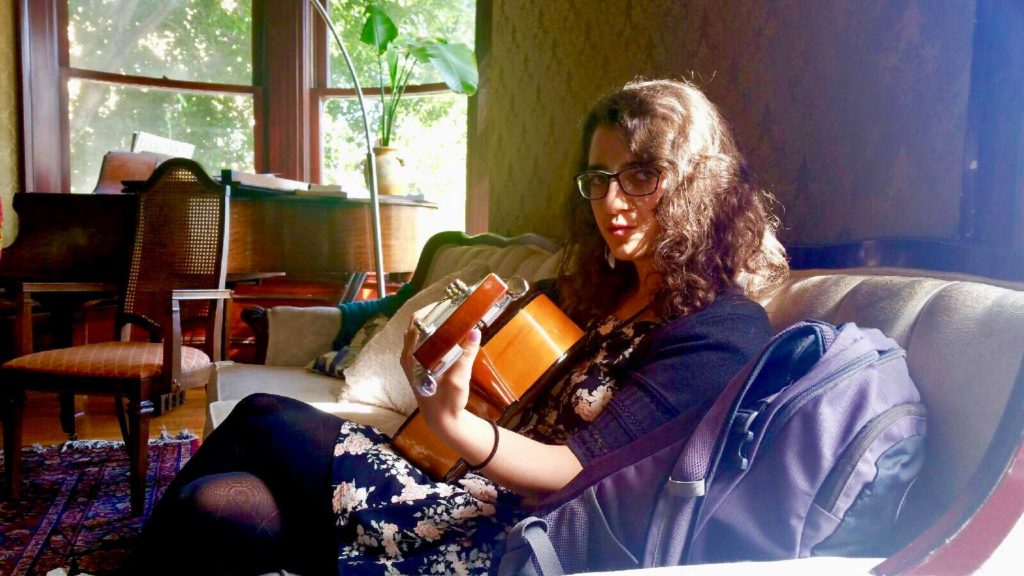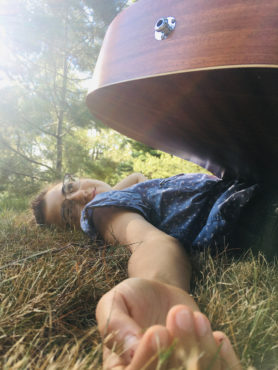
Credit: Sandjida Aktar
This week we spoke via Zoom with Donna Vatnick who released her solo album Memos from Borscht Belt on December 9th. Known for her work with folk duo Otter and also indie rock group Strawberry Machine, Vatnick embarked on a trip to Upstate New York to the remnants of a once bustling community of Jewish settlers known as The Borscht Belt where inspiration struck. A somber and reflective collection of eight tracks, Memos sees Vatnick at her most personal and raw.
Allston Pudding: What brought you to Monticello, NY? To the Borscht Belt?
Donna Vatnick: At the beginning of COVID I was living in Boston, my partner and I were newly dating and we were like “what do we do?”. He was living in New York so we just moved to our mutual friend’s house in Connecticut, in the middle of nowhere. It was communal so there were other people living there. After a while we were like we need to get away from here, so we just rented an Airbnb for a month in Upstate New York. I later found out that the Borscht Belt was the center of European/Jewish life back in the day and I’m a first generation Jew, my parents are from Russia, so borscht is my life. There were all these Hasidic Jews, and I hadn’t been around Jews in such a long time. I couldn’t really hang with them [due to COVID] but there were all these bakeries and challah bread…
AP: So you could still experience that community feeling?
D: Yeah and I don’t fit into it because I’m a woman and not Hasidic, but I still felt this interesting kind of connection to this place that I don’t really understand. So it was basically an accident that we ended up there but it was a really cool accident.
AP: Was the decision to release the songs stripped down a quick one? Was that always your intention?
D: Yeah. A lot of songwriters that I’ve talked to during quarantine have expressed a feeling that the open mic vibe is gone because you can’t have live music. And a lot of people I know were still writing songs but didn’t know who they were writing for. There’s this breakdown of meaning now that there’s so much distance between people, and most musicians I know don’t want to spend time recording their own stuff – or don’t have access to [a studio]. So I thought what if you just take your voice memos? Most songwriters just have thousands of them on their phone and it’s beautiful stuff from the moment it’s born. I’ve been wanting to do something like this for many years but I was always nervous because it’s not going to be “perfect”, it’s gonna sound like shit, phones suck, and judgement blah blah blah. But we’re all really vulnerable right now and I can be too. I can be naked, who cares [laughs]. I just hope that people are like, oh I can still share my music and it doesn’t have to be this big release and it doesn’t have to be marketed. It’s music for the sake of connection.
AP: Well they definitely don’t sound like shit. They’re very beautiful. I love the peaceful, devastating, emotional kind of feel that the album has. What was the recording process like? Was it just you?
D: It was just me. I told myself when I went to the Borscht Belt that whatever I make in that month will be on the album. I made a lot of things, but I decided to go with the simplest ones. Don’t do anything crazy, just keep it simple. Listen to Johnny Cash and just chill the fuck out [laughs]. It doesn’t have to be complicated. I would write a song, record it on my phone and it’s done. I usually didn’t even have the lyrics written out. I would just improvise them so most of the songs I didn’t plan. Probably didn’t play them more than twice before recording them. Then I sent them to my friend Jason Kimball and he would just make the volume a little higher, [made some adjustments] and that was it.
AP: How long would you say from the start of recording did you feel like, okay this is it I want to release these?
D: Less than a month. I went to Borscht Belt in November, I wrote most of the songs in the last two weeks and then released it the first week of December.
AP: You mentioned Johnny Cash, but who would you say your influences were for this or for your music as a whole?
D: For this: Johnny Cash. I’ve never listened to Country music before, I think partially because my family is not from [the US]. Also The Carter Family, Guthrie, Adrienne Lenker – obviously. She came out with her album right as I was already half way through doing mine and I adore her.
AP: How would you say quarantine has affected your creative process? I know with this album being stripped down and without using a studio, but how would you say it’s been impacted beyond that? Compared to how you would work with Otter and Strawberry Machine?

Courtesy of Vatnick’s Bandcamp
D: So I’ve been writing songs by myself since I was a kid, and I still am very insecure about the whole process. I just hate showing people my stuff. Being in a group like Strawberry Machine or Otter it was a lot harder to write songs that were only mine. I was writing songs with Clay Williams [of Strawberry Machine] and then writing songs with Jason and I feel like I’m constantly with other people doing different kinds of musical collaboration. Which is so magical and amazing and over the years it’s helped me be more confident, like who cares if no one likes it? But I think something that has shifted this year is this feeling of having to do this alone in some way, and there are things that I have to write and reflect on that can’t have another person there when I’m doing it… I have to sit down and really let myself be honest with myself. When I was writing this album that was really hard because I forgot how to build that relationship with myself in some ways. But the words that came out of my mouth on this album really mean something to me in a way that’s not conceptual or metaphorical, they’re just so basic it’s terrifying. They’re about life and they’re about my relationship with my partner and then to release it to whoever is also terrifying.
AP: With you being around your collaborators so often are there plans to revisit Strawberry Machine or Otter?
D: Yeah. Jason and I, [who make up Otter], are releasing our next album called Old Growth that we’ve been working on for about a year and a half. It’s about old growth forests. These forests that haven’t really been intervened with that develop this really rich texture and history. Walking around there’s this energy that is so full and dense. So we recorded that before COVID but have been editing it for over a year and were also working on another album now. With Strawberry Machine, we live together most of the time but haven’t been writing as much with [everything going on] and with Clay being a teacher and [teacher’s are] in such deep shit right now but we hope to release an album in the next decade [laughs], but it’s hard to predict.
AP: Would you ever plan to release more solo music like this?
D: It depends on my mood I guess [laughs]. Right now there’s nothing in my head that’s telling me “Oh I have to do this”. In November, going into a quiet non-communal place like the Borscht Belt where I could process my feelings of the last year I knew I had to do this, but right now I don’t know what’s to come. You can’t put too much pressure on that. It’s magical because you don’t know, you don’t constrain it. I’ll just see if the winds bless me or not. People put a lot of pressure on themselves to make something great but you can’t judge the creative baby. It’s just a baby. It rises and needs to eat and needs to sleep and you have to be able to feed it and touch it’s head and not judge it when it’s coming out… you can judge it later.
AP: Would you have any advice for artists who feel like they are bogged down by this year?
D: Ooof, I wish someone would give me advice [laughs]. There’s so much going on and it’s so sad on every level, but I think it’s important to be hopeful and think things might get better. But it’s also understandable and important to feel like this is not good and the future is very uncertain and we don’t know but there’s always this illusion that we may. And as an individual you feel like I have to do my part but there are these whole systems and we as individuals can’t change that – which sounds horrible…
AP: Yeah it’s like David and Goliath, but we just have to know that there’s all these other individuals who feel that same way.
D: Exactly. And the power of art, historically, is to bring people together and make people feel less alone. I think relationships are the most important things in the universe and they keep us afloat. So I guess my advice to myself is to keep my relationships strong, whether it’s family, friends or new people, to treat them with complete respect because that is the most important investment. More than money, more than your career.
AP: More of a silly question I suppose but you use a lot of natural sounds in your music and I was wondering if you had a favorite sound that resonates with you or brings you comfort?
D: This is weird but I do love the sound of mud, like stepping in it but I don’t really record that [laughs]. But obviously birds, running water, wind – the basic stuff. I love bugs, all kinds of fluttering and chirps.
AP: I’ve always loved the sound of crows in the early morning or the sound of night in the winter. Almost completely quiet except this white noise that permeates the air.
D: Yes! That is so beautiful, the woods in the winter is like fucking silent. You go out there and sound is just absorbed by everything and you’re like, “am i even here?”
AP: I find myself subconsciously holding my breath in moments like that and I have to remind myself that I can still exist in that environment at that time.
D: Totally. It’s almost funny because we do feel so separate from those spaces like why else would we hold our breath and ask “should I step in this pristine snow? Should I really ruin it with my humanity?” There’s this funny distance, like we are part of it but we aren’t but we also are?
You can listen to Memos from Borscht Belt below, and check out Otter’s new album Old Growth out now!
